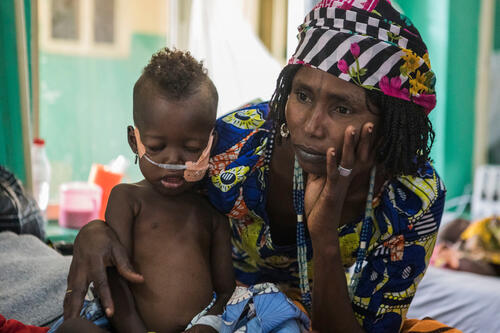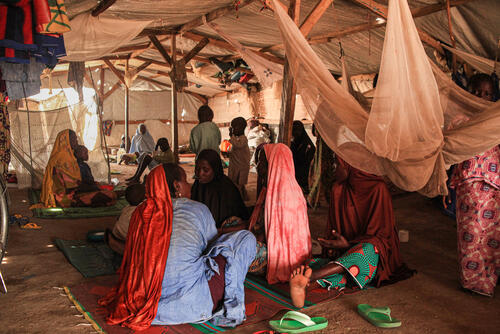Médecins Sans Frontières (MSF) first worked in Borno, northeast Nigeria, in 2014. We have had a continuous presence in the state since 2016, running five hospitals across Borno state, providing a range of services, including treatment for malnutrition and malaria.
Ahsan H. Abbasi, MSF Head of Mission in Nigeria, talks about the reasons why we closed our activities in Gwoza and Pulka, in Borno state, in August 2021.
Why did MSF start working in Borno?
Northeast Nigeria has endured more than a decade of armed conflict, which has exacerbated existing issues such as seasonal malnutrition, measles and malaria. It has also had a huge impact on people’s ability to meet their basic needs. According to IOM, Borno accounts for over 70 per cent of displacement in Nigeria, with 1.5 million internally displaced people in the state. Some displaced have fled to other towns, states and even to neighbouring Cameroon, Chad and Niger; some people have been displaced as many as seven times.
As a result of (often repeated) displacement, many have been unable to access much needed medical care. In 2020, OCHA estimated at two million the number of people in northeast Nigeria who live in areas controlled by armed groups, with no access to humanitarian assistance at all. Conditions for the displaced remain poor, despite many having been displaced for months or even years.

What prompted the closure of activities in Gwoza and Pulka?
MSF has decided to close our medical activities in Gwoza and Pulka, Borno State, due to security developments in the area and accrued threats to humanitarian workers.
In the past months, fighting in the area has led to changes among the non-state armed groups controlling the area, with a much more hostile non-state armed group expanding its influence in the northeast and beyond.
In addition, clear statements made by the group in August 2020 declaring international NGOs as a legitimate target, have prompted humanitarian organisations to gradually reduce the presence of international staff outside Maiduguri. MSF has been the only international NGO with a permanent presence of international staff in Pulka and Gwoza for the past five years.
The threats against humanitarian workers undermine the level of security that we need to operate safely in Gwoza and Pulka. Based on the analysis we made of the context, our ability to mitigate this high level of insecurity is limited. This puts the lives of our staff and patients at risk, while their right to safety and security must be a priority, as much as their right to respectively provide and receive medical and healthcare services in a safe environment.
Our decision to leave Gwoza and Pulka has been a very painful one. We know it will have devastating consequences for hundreds of thousands of people, who will be cut off from humanitarian aid and healthcare services. However, we need to strike the right balance with acceptable risks to be taken by our staff. As of August 2021, MSF will no longer have any presence or staff in Gwoza and Pulka.
However, should the situation change, we will reassess the security on the ground and the viability to resume operations. We will also continue to provide access to free healthcare to people in other areas of Borno State, such as in Maiduguri and in Ngala town. Our social mission to save lives remains unchanged.
Our decision to leave Gwoza and Pulka has been a very painful one. We know it will have devastating consequences for... people, who will be cut off from humanitarian aid.Ahsan H. Abbasi, MSF Head of Mission
What are MSF medical activities in the area?
MSF has been running five hospitals across Borno state, providing specialised paediatric care, treatment for malnutrition and malaria, maternity care, mental health treatment, surgery and treatment for survivors of sexual and gender-based violence. We also conducted mass seasonal malaria prevention campaigns during the peak of rainy season.
Our teams have borne witness to food insecurity and extremely limited basic supplies, including non-food items like blankets and soap. Water is also a major issue for many displaced, both in terms of limited supply and low quality.
In Maiduguri, we run an 80-bed paediatric hospital in Gwange district and a 200-bed nutrition centre in the Kushari neighbourhood. MSF also works in other towns in Borno state, tackling malaria, malnutrition, and typhoid, providing support on water and sanitation, and treating diarrhoea.
In Pulka, we ran a 97-bed hospital which offered free-of-charge general and specialist healthcare to all residents, including displaced people. Roughly 58,000 patients were treated in the hospital’s outpatient department in 2020. Our teams also worked on improving access to clean water.
In Gwoza, our team assisted in the administration of the seasonal anti-malaria therapy (seasonal malaria chemoprophylaxis) to over 12,000 children in 2020. We also assisted women to deliver 2,357 babies, performed 54 caesarean sections, and treated 175 patients for measles, amongst other illnesses.
We responded to emergencies such as outbreaks and internal displacement, conducted health assessments including mass malnutrition screening, and health outreach programmes with mobile clinics.



